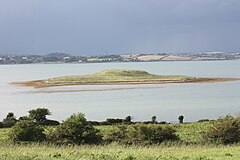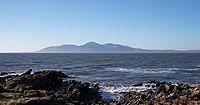County Down
| County Down United Kingdom | |
 Strangford Lough | |
|---|---|

| |
| [Interactive map] | |
| Area: | 950 square miles |
| Population: | 528,983 |
| County seat: | Downpatrick |
| Biggest town: | Belfast - chiefly in Antrim |
| County flower: | Spring squill [1] |
The County of Down is a shire on Ulster's eastern coast. It is named after its county town, Downpatrick. It covers an area of 950 square miles.
The county bears in its narrow confines contrasts of sea, loughs, low plains and lofty mountains. The south of the county is taken up with the Mourne Mountains, the highest in Ulster and amongst which stands Slieve Donard, the highest point in Northern Ireland. Down contains both the southernmost point of Northern Ireland, Cranfield Point on the shore of Carlingford Lough, and the easternmost point of the island of Ireland; Burr Point on the Ards Peninsula.
The North Channel and Irish Sea wash Downshire’s eastern edge; to the north is Belfast Lough; and to the south Carlingford Lough, which separates County Down from County Louth in the Republic of Ireland. The county’s north-western corner is on Lough Neagh and from not far off the River Lagan make the border with County Antrim to the north. To the west is County Armagh and to the south is County Louth.
Landscape
Coasts and loughs

The county has a coastline along Belfast Lough to the north and Carlingford Lough to the south, the latter the border with the Irish Republic, beneath the looming mass of the Mourne Mountains. Down also contains part of the shore of Lough Neagh. Smaller loughs include Lough Island Reavy.
Along the county’s east coast runs the long Ards Peninsula, an arm of land reaching down between the open sea and Strangford Lough. The Lough is one of the wonders of Ulster, a shallow, tidal sea-lough with a narrow mouth to the sea, dotted with beauteous islands, a haven for wildlife.
The Lecale Peninsula is a smaller peninsula to the south of some historical significance. Some 78 square miles between Downpatrick and Dundrum, it reaches towards Ards almost to close the narrow entrance to Strangford Lough.
There are several islands off the Down coast: Mew Island, Light House Island and the Copeland Islands, all of which lie to the north of the Ards Peninsula. Gunn Island lies off the Lecale coast. In addition there is a vast number of small islands in Strangford Lough.
Towns
The largest town in the county is Belfast, which though mainly in neighbouring Antrim, stands square on the county border with much of its area in Downshire. Outside Belfast the largest town is Bangor, chief of the towns of North Down, along the shore of Belfast Lough.
Rivers
The River Lagan rises in the Mourne Mountains and flows north, whence it forms most of the border with County Antrim. The Upper River Bann also flows through the south-western areas of the county. Other rivers include the Newry River, the border with Armagh, and Quoile.
The Mourne Mountains

County Down is where, in the words of the famous song by Percy French, "The mountains of Mourne sweep down to the sea", and the granite Mourne Mountains continue to be renowned for their beauty. Slieve Donard, at 2,789 feet, is the highest peak in the Mournes and in Northern Ireland. Another important peak is Slieve Croob, at 1,752 feet, the source of the River Lagan.
Towns and villages

Bangor stands on the north coast in a district with many smaller seaside towns serving commuters and day-visitors in the summer. Three cities are partly in Down: Belfast in the north, Newry on the western border with County Armagh, half in one county and half in the other and the County Antrim city of Lisburn as it trespasses over the Lagan into Down.
The main towns are:
- Ballynahinch
- Bangor
- Banbridge
- Carryduff
- Comber
- Donaghadee
- Downpatrick (county town)
- Dromore
- Dundonald
- Holywood
- Kilkeel
- Newcastle
- Newtownards
- Warrenpoint
Parishes
- Aghaderg
- Annaclone
- Annahilt
- Ardglass
- Ardkeen
- Ardquin
- Ballee
- Ballyculter
- Ballykinler
- Ballyphilip
- Ballytrustan
- Ballywalter
- Bangor
- Blaris†:
- Bright
- Castleboy
- Clonallan
- Clonduff
- Comber
- Donaghadee
- Donaghcloney
- Donaghmore
- Down
- Dromara
- Dromore
- Drumballyroney
- Drumbeg†
- Drumbo
- Drumgath
- Drumgooland
- Dundonald
- Dunsfort
- Garvaghy
- Greyabbey
- Hillsborough
- Holywood
- Inch
- Inishargy
- Kilbroney
- Kilclief
- Kilcoo
- Kilkeel
- Killaney
- Killinchy
- Killyleagh
- Kilmegan
- Kilmood
- Kilmore
- Knockbreda
- Loughinisland
- Maghera
- Magheradrool
- Magheralin‡
- Magherally
- Moira
- Newry‡
- Newtownards
- Rathmullan
- St Andrews (alias Ballyhalbert)
- Saintfield
- Saul
- Seapatrick
- Slanes
- Tullylish
- Tullynakill
- Tyrella
- Warrenpoint
†: Extends into County Antrim.
‡: Extends into County Armagh.
Additionally, the parishes of Lambeg and Shankill extend into Downshire.
Baronies

County Down is divided into 14 baronies:
Sights of County Down
| Key | |
| Cathedral/Abbey/Priory | |
| Accessible open space | |
| Amusement/Theme Park | |
| Castle | |
| Country Park | |
| State Care | |
| Forestry Commission | |
| Heritage railway | |
| Historic House | |
| Museum (free/not free) | |
| National Trust | |
| Zoo | |
- The Brontë Homeland (between Rathfriland and Banbridge, where Patrick Bronty, later Brontë, was born and had his church, more famous though he was in Haworth in Yorkshire where his daughters Anne, Charlotte and Emily Brontë were born and raised.
- The city of Newry in the south of the county contains St Patrick's (Church of Ireland, 1578), overlooking the city centre from Church Street, on the east side of the city, which is considered to be Ireland's first ever church built as a Protestant church.
- Exploris, the Northern Ireland Aquarium, in Portaferry, on the Ards shore of Strangford Lough.
- The Old Inn in Crawfordsburn is one of Ireland's oldest hostelries, with records dating back to 1614. The inn claims that people who have stayed there include Jonathan Swift, Dick Turpin, Peter the Great, Lord Tennyson, Charles Dickens, Anthony Trollope, former US president George H W Bush, and C S Lewis, who honeymooned there.[1]
- Scrabo Tower, in Newtownards, was built as a memorial to Charles Stewart, 3rd Marquess of Londonderry.
- Down Cathedral in Downpatrick: Saint Patrick is reputed to be buried here, reputedly alongside St Brigid and St Columba
- Saul, County Down (from the Irish ‘’Sabhall’’ meaning "Barn" – where Saint Patrick said his first mass in Ireland
See also
| ("Wikimedia Commons" has material about County Down) |
References
Books
- Harris, Walter (attributed). 1744. The Ancient and Present State of the County of Down...'Dublin.
Outside links
- County Down tourism
- Armagh and Down tourism
- Culture Northern Ireland - Industrial Heritage of County Down
- Genealogy indexes for County Down
- Ardglass fishing port on East Down coast
| Counties of the United Kingdom |
|---|
|
Aberdeen • Anglesey • Angus • Antrim • Argyll • Armagh • Ayr • Banff • Bedford • Berks • Berwick • Brecknock • Buckingham • Bute • Caernarfon • Caithness • Cambridge • Cardigan • Carmarthen • Chester • Clackmannan • Cornwall • Cromarty • Cumberland • Denbigh • Derby • Devon • Dorset • Down • Dumfries • Dunbarton • Durham • East Lothian • Essex • Fermanagh • Fife • Flint • Glamorgan • Gloucester • Hants • Hereford • Hertford • Huntingdon • Inverness • Kent • Kincardine • Kinross • Kirkcudbright • Lanark • Lancaster • Leicester • Lincoln • Londonderry • Merioneth • Middlesex • Midlothian • Monmouth • Montgomery • Moray • Nairn • Norfolk • Northampton • Northumberland • Nottingham • Orkney • Oxford • Peebles • Pembroke • Perth • Radnor • Renfrew • Ross • Roxburgh • Rutland • Selkirk • Shetland • Salop • Somerset • Stafford • Stirling • Suffolk • Surrey • Sussex • Sutherland • Tyrone • Warwick • West Lothian • Westmorland • Wigtown • Wilts • Worcester • York |
